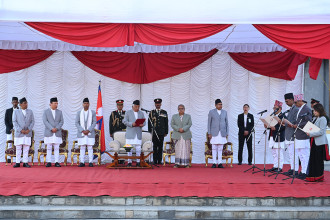
NEW DELHI: BIMSTEC Business Summit held in New Delhi emphasised the need for BIMSTEC countries to expand their areas of cooperation collectively.
Minister for Industry, Commerce and Supplies, Damodar Bhandari, is on a three-day official visit to India to participate in the Summit. The event is hosted by the Ministry of External Affairs of the Government of India, in association with the Confederation of Indian Industries (CII).
The Bangladesh-India-Sri Lanka-Thailand Economic Cooperation group, established in June 1997, was expanded in 2004 to include Nepal, Bhutan, and Myanmar, becoming the Bay of Bengal Initiative for Multi-Sectoral Technical and Economic Cooperation (BIMSTEC).
During the Summit, discussions will focus on the benefits for Nepal from BIMSTEC, including trade promotion and business opportunities with India. Minister Bhandari's participation is expected to enhance Nepal's access to the South Asian and East Asian regional preferential markets, mitigating the impact of Nepal's graduation to developed country status.
Nepal anticipates that its participation will expand export markets, enhance regional value chain linkages, facilitate trade, increase customs cooperation, reduce trade and logistics costs, and boost regional investment. Additionally, tourism and the export of various services, including information technology, are expected to increase.
The CII has released a study with recommendations to improve economic cooperation among BIMSTEC member countries. The study suggests expanding skill development, evolving e-commerce cooperation, boosting digital public infrastructure, and fostering women-led development. It also recommends finalising a phased Free Trade Agreement (FTA) to promote investment, job creation, technology partnerships, and services.
The GDP of BIMSTEC countries is currently about $4.5 trillion, with a combined external trade of $1.95 trillion in 2022. However, intra-regional trade remains low. The CII study highlights the potential for greater economic integration and industry collaboration to accelerate growth and development in the region.
The member countries should consider easing foreign direct investment (FDI) restrictions, improving energy collaborations, developing agricultural technology transfer agreements, increasing regional cooperation in tourism, establishing technology transfer facilities, and enhancing transport connectivity between BIMSTEC states.
The CII study states that the sixth BIMSTEC Summit meeting will be an opportunity to enhance business engagement in the region, deepen economic linkages within the region, and collectively address external opportunities.
With greater industry collaborations and joint projects, the BIMSTEC region and its member states could accelerate their efforts towards growth and development, deriving significant benefits in terms of employment and income generation.
The CII BIMSTEC Business Summit aims to catalyse business networks and industry cooperation to align with governmental initiatives.
RSS/ANI






-1765524551.jpeg)